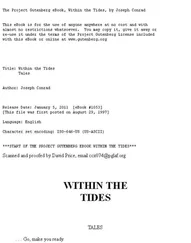Joseph Conrad - Tales of Unrest
Здесь есть возможность читать онлайн «Joseph Conrad - Tales of Unrest» — ознакомительный отрывок электронной книги совершенно бесплатно, а после прочтения отрывка купить полную версию. В некоторых случаях можно слушать аудио, скачать через торрент в формате fb2 и присутствует краткое содержание. Жанр: unrecognised, на английском языке. Описание произведения, (предисловие) а так же отзывы посетителей доступны на портале библиотеки ЛибКат.
- Название:Tales of Unrest
- Автор:
- Жанр:
- Год:неизвестен
- ISBN:нет данных
- Рейтинг книги:5 / 5. Голосов: 1
-
Избранное:Добавить в избранное
- Отзывы:
-
Ваша оценка:
- 100
- 1
- 2
- 3
- 4
- 5
Tales of Unrest: краткое содержание, описание и аннотация
Предлагаем к чтению аннотацию, описание, краткое содержание или предисловие (зависит от того, что написал сам автор книги «Tales of Unrest»). Если вы не нашли необходимую информацию о книге — напишите в комментариях, мы постараемся отыскать её.
Tales of Unrest — читать онлайн ознакомительный отрывок
Ниже представлен текст книги, разбитый по страницам. Система сохранения места последней прочитанной страницы, позволяет с удобством читать онлайн бесплатно книгу «Tales of Unrest», без необходимости каждый раз заново искать на чём Вы остановились. Поставьте закладку, и сможете в любой момент перейти на страницу, на которой закончили чтение.
Интервал:
Закладка:
"We did not hear your boat's hail!" I exclaimed.
"Boat! The man's swum off," drawled out Hollis from the locker. "Look at him!"
He breathed heavily, wild-eyed, while we looked at him in silence. Water dripped from him, made a dark pool, and ran crookedly across the cabin floor. We could hear Jackson, who had gone out to drive away our Malay seamen from the doorway of the companion; he swore menacingly in the patter of a heavy shower, and there was a great commotion on deck. The watchmen, scared out of their wits by the glimpse of a shadowy figure leaping over the rail, straight out of the night as it were, had alarmed all hands.
Then Jackson, with glittering drops of water on his hair and beard, came back looking angry, and Hollis, who, being the youngest of us, assumed an indolent superiority, said without stirring, "Give him a dry sarong—give him mine; it's hanging up in the bathroom." Karain laid the kriss on the table, hilt inwards, and murmured a few words in a strangled voice.
"What's that?" asked Hollis, who had not heard.
"He apologizes for coming in with a weapon in his hand," I said, dazedly.
"Ceremonious beggar. Tell him we forgive a friend . . . on such a night," drawled out Hollis. "What's wrong?"
Karain slipped the dry sarong over his head, dropped the wet one at his feet, and stepped out of it. I pointed to the wooden armchair—his armchair. He sat down very straight, said "Ha!" in a strong voice; a short shiver shook his broad frame. He looked over his shoulder uneasily, turned as if to speak to us, but only stared in a curious blind manner, and again looked back. Jackson bellowed out, "Watch well on deck there!" heard a faint answer from above, and reaching out with his foot slammed-to the cabin door.
"All right now," he said.
Karain's lips moved slightly. A vivid flash of lightning made the two round stern-ports facing him glimmer like a pair of cruel and phosphorescent eyes. The flame of the lamp seemed to wither into brown dust for an instant, and the looking-glass over the little sideboard leaped out behind his back in a smooth sheet of livid light. The roll of thunder came near, crashed over us; the schooner trembled, and the great voice went on, threatening terribly, into the distance. For less than a minute a furious shower rattled on the decks. Karain looked slowly from face to face, and then the silence became so profound that we all could hear distinctly the two chronometers in my cabin ticking along with unflagging speed against one another.
And we three, strangely moved, could not take our eyes from him. He had become enigmatical and touching, in virtue of that mysterious cause that had driven him through the night and through the thunderstorm to the shelter of the schooner's cuddy. Not one of us doubted that we were looking at a fugitive, incredible as it appeared to us. He was haggard, as though he had not slept for weeks; he had become lean, as though he had not eaten for days. His cheeks were hollow, his eyes sunk, the muscles of his chest and arms twitched slightly as if after an exhausting contest. Of course it had been a long swim off to the schooner; but his face showed another kind of fatigue, the tormented weariness, the anger and the fear of a struggle against a thought, an idea—against something that cannot be grappled, that never rests—a shadow, a nothing, unconquerable and immortal, that preys upon life. We knew it as though he had shouted it at us. His chest expanded time after time, as if it could not contain the beating of his heart. For a moment he had the power of the possessed—the power to awaken in the beholders wonder, pain, pity, and a fearful near sense of things invisible, of things dark and mute, that surround the loneliness of mankind. His eyes roamed about aimlessly for a moment, then became still. He said with effort—
"I came here . . . I leaped out of my stockade as after a defeat. I ran in the night. The water was black. I left him calling on the edge of black water. . . . I left him standing alone on the beach. I swam . . . he called out after me . . . I swam . . ."
He trembled from head to foot, sitting very upright and gazing straight before him. Left whom? Who called? We did not know. We could not understand. I said at all hazards—
"Be firm."
The sound of my voice seemed to steady him into a sudden rigidity, but otherwise he took no notice. He seemed to listen, to expect something for a moment, then went on—
"He cannot come here—therefore I sought you. You men with white faces who despise the invisible voices. He cannot abide your unbelief and your strength."
He was silent for a while, then exclaimed softly—
"Oh! the strength of unbelievers!"
"There's no one here but you—and we three," said Hollis, quietly. He reclined with his head supported on elbow and did not budge.
"I know," said Karain. "He has never followed me here. Was not the wise man ever by my side? But since the old wise man, who knew of my trouble, has died, I have heard the voice every night. I shut myself up—for many days—in the dark. I can hear the sorrowful murmurs of women, the whisper of the wind, of the running waters; the clash of weapons in the hands of faithful men, their footsteps—and his voice! . . . Near . . . So! In my ear! I felt him near . . . His breath passed over my neck. I leaped out without a cry. All about me men slept quietly. I ran to the sea. He ran by my side without footsteps, whispering, whispering old words—whispering into my ear in his old voice. I ran into the sea; I swam off to you, with my kriss between my teeth. I, armed, I fled before a breath—to you. Take me away to your land. The wise old man has died, and with him is gone the power of his words and charms. And I can tell no one. No one. There is no one here faithful enough and wise enough to know. It is only near you, unbelievers, that my trouble fades like a mist under the eye of day."
He turned to me.
"With you I go!" he cried in a contained voice. "With you, who know so many of us. I want to leave this land—my people . . . and him—there!"
He pointed a shaking finger at random over his shoulder. It was hard for us to bear the intensity of that undisclosed distress. Hollis stared at him hard. I asked gently—
"Where is the danger?"
"Everywhere outside this place," he answered, mournfully. "In every place where I am. He waits for me on the paths, under the trees, in the place where I sleep—everywhere but here."
He looked round the little cabin, at the painted beams, at the tarnished varnish of bulkheads; he looked round as if appealing to all its shabby strangeness, to the disorderly jumble of unfamiliar things that belong to an inconceivable life of stress, of power, of endeavour, of unbelief—to the strong life of white men, which rolls on irresistible and hard on the edge of outer darkness. He stretched out his arms as if to embrace it and us. We waited. The wind and rain had ceased, and the stillness of the night round the schooner was as dumb and complete as if a dead world had been laid to rest in a grave of clouds. We expected him to speak. The necessity within him tore at his lips. There are those who say that a native will not speak to a white man. Error. No man will speak to his master; but to a wanderer and a friend, to him who does not come to teach or to rule, to him who asks for nothing and accepts all things, words are spoken by the camp-fires, in the shared solitude of the sea, in riverside villages, in resting-places surrounded by forests—words are spoken that take no account of race or colour. One heart speaks—another one listens; and the earth, the sea, the sky, the passing wind and the stirring leaf, hear also the futile tale of the burden of life.
He spoke at last. It is impossible to convey the effect of his story. It is undying, it is but a memory, and its vividness cannot be made clear to another mind, any more than the vivid emotions of a dream. One must have seen his innate splendour, one must have known him before—looked at him then. The wavering gloom of the little cabin; the breathless stillness outside, through which only the lapping of water against the schooner's sides could be heard; Hollis's pale face, with steady dark eyes; the energetic head of Jackson held up between two big palms, and with the long yellow hair of his beard flowing over the strings of the guitar lying on the table; Karain's upright and motionless pose, his tone—all this made an impression that cannot be forgotten. He faced us across the table. His dark head and bronze torso appeared above the tarnished slab of wood, gleaming and still as if cast in metal. Only his lips moved, and his eyes glowed, went out, blazed again, or stared mournfully. His expressions came straight from his tormented heart. His words sounded low, in a sad murmur as of running water; at times they rang loud like the clash of a war-gong—or trailed slowly like weary travellers—or rushed forward with the speed of fear.
Читать дальшеИнтервал:
Закладка:
Похожие книги на «Tales of Unrest»
Представляем Вашему вниманию похожие книги на «Tales of Unrest» списком для выбора. Мы отобрали схожую по названию и смыслу литературу в надежде предоставить читателям больше вариантов отыскать новые, интересные, ещё непрочитанные произведения.
Обсуждение, отзывы о книге «Tales of Unrest» и просто собственные мнения читателей. Оставьте ваши комментарии, напишите, что Вы думаете о произведении, его смысле или главных героях. Укажите что конкретно понравилось, а что нет, и почему Вы так считаете.












